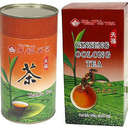Tea: Ginseng Oolong
A Ginseng Oolong from Ten Fu's Tea
| Brand: | Ten Fu's Tea |
| Style: | Ginseng Oolong |
| Region: | China |
| Caffeine: | Caffeinated |
| Loose? | Loose |
| # Ratings: | 1 View All |
| Product page: | Ginseng Oolong |
Reviewer: Difflugia

✓ 170 teas reviewed
✓ 2 of Ginseng Oolong
✓ 2 of Flavored Oolong
✓ 2 of Ten Fu's Tea
✓ 28 from China
Review of Ginseng Oolong
June 19th, 2017
| Aroma | Flavor | Value | Total |
| 9 of 10 | 4 of 5 | 5 of 5 | 85 of 100 |
| Superb | Good | Outstanding |
Before discussing the tea, I want to mention a little about the branding and packaging. First, the "Ten Fu's" font and graphics look like they're intentionally similar to Ten Ren's trademark logo, but Ten Fu's and Ten Ren are different companies. Second, cans of Ten Fu's tea include a Taiwan logo on the can, which many brands of Taiwanese oolong teas display, including Ten Ren's King's Tea, which this tea seems to be a clone of. As far as I know, however, this tea's origin is mainland China. While I really like this tea and drink quite a lot of it personally, shady marketing practices should always be considered a red flag. Caveat emptor.
The dry tea is dark green, has a strong aroma and smells sweet, rich and lightly grassy. The tea smells wonderful while brewing.
The tea's flavor isn't quite as rich as the aroma, but it's still flavorful and has a nice body to it. The taste starts out mildly astringent and lightly fruity, reminiscent of ripe plum skins. The ginseng becomes apparent in the finish as a slightly bittersweet flavor reminiscent of licorice. The ginseng flavor lasts a long time on the palate. If you savor the finish before the next sip, a cup of this tea will last you a while.
I usually drink this tea Western style, brewing the first cup for four minutes. Even so, while subsequent steepings have much less ginseng flavor, the oolong is high enough quality to get one or two more brews from the same leaves.
This tea is so similar tasting to the Ten Ren fourth grade King's Tea that I have a hard time telling which tea I have from a single cup. Tasting them side by side, the Ten Ren tea has a slightly richer flavor overall, probably indicating a slightly higher grade of the base oolong tea. Ten Fu's tea tastes slightly more strongly of ginseng, which may be a pro or con depending on how much you like ginseng.
In any case, the differences between the two are subtle and Ten Fu's tea is a little more than half the price of Ten Ren's 103 King's Tea ($2.03/oz compared to $3.34/oz).
Add your own review
Comments:
| Alex Zorach wrote: on June 19th, 2017 |
The marketing and relationship of these different brands, including Ten Ren, Ten Fu, and Uncle Lee's, is confusing and opaque to me. Reading the companies' websites, I just feel confused. The companies clearly have the same styling to the logo and packaging. Ten Fu's website, which is very corporate, seems so hint at or suggest a claim that it owns the Uncle Lee's brand, and it references the individual for whom that brand is name...but their website makes bold, grandiose claims that seem dubious and make me unlikely to trust what they write. Like you, I get a slightly sketchy feeling from it. Uncle Lee's website also sells Ten Fu teas, and talks about Ten Ren, but without clearly explaining their relationship to these companies or brands.
There may be some cultural differences here. The whole concept of a "Brand" is a Western concept that has only entered East Asian cultures in recent years. Much of the tea market in China, Taiwan, and other East Asian countries, still involves a lot of unbranded products.
Even though these websites are written in English, I feel like I'm reading another language...like something has been lost in the translation.
I feel pretty puzzled...and like you I feel a little skeptical. I don't necessarily think there is any intentional deception or ill intent, I just get the sense that I don't really know what is going on with these companies or brands.
| Difflugia wrote: on June 19th, 2017 |
For what it's worth, my observations are from trying to sort out the same confusion. I hadn't even seen the "actual" Ten Fu's website before your link in the company description and had only seen the Uncle Lee's one.
I tried this tea on the recommendation of a shop owner whose judgement I've come to trust. My concerns aren't enough to put me off drinking the tea, but there are enough general problems in the tea trade (mislabeling, adulteration, pesticides, ...) that I thought anyone else trying it should at least know that things seemed a little off.
I've read that most tea sold in Taiwan as Taiwanese is actually from the mainland and most genuine Taiwanese tea is exported. My wild guess is that this company began as a source of mainland teas that could masquerade as Taiwanese, but that ultimately became more profitable on their own merits.


